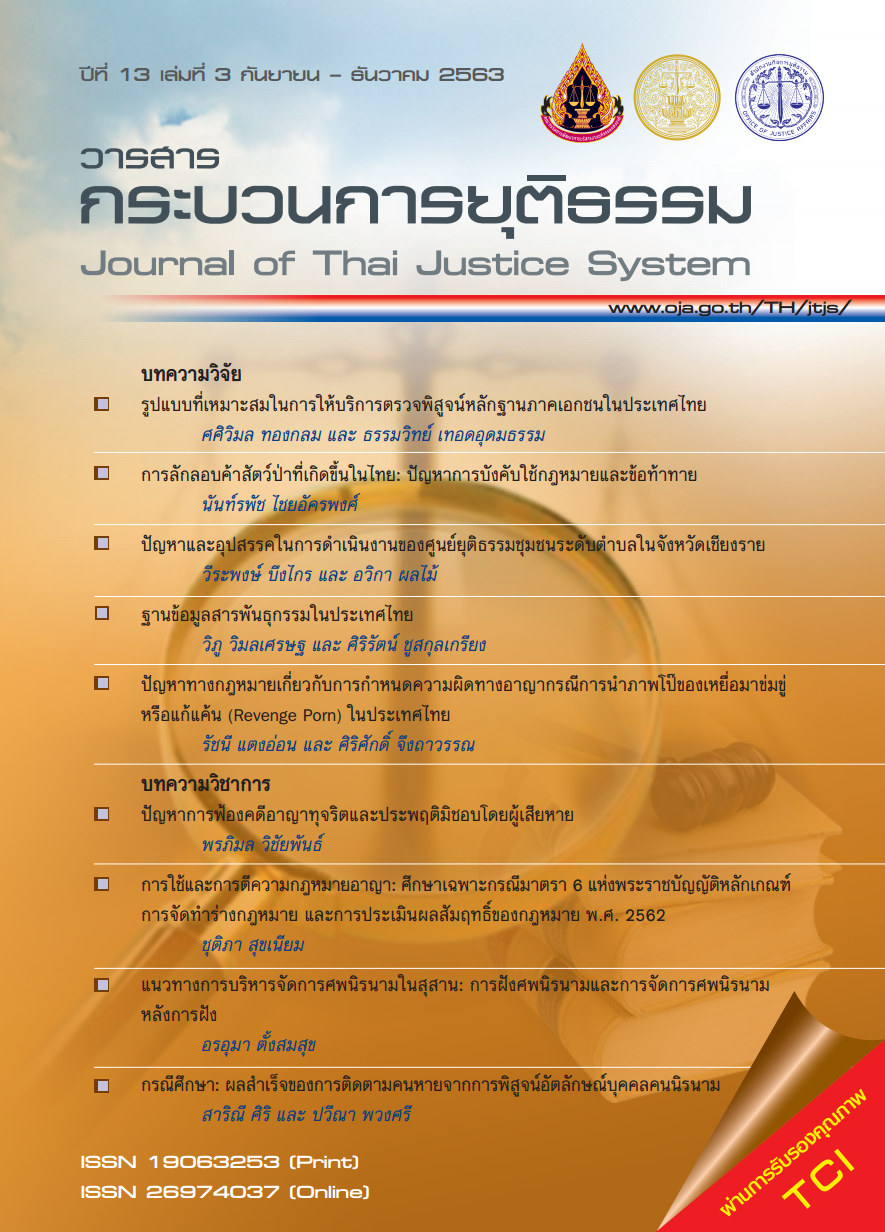การใช้และการตีความกฎหมายอาญา: ศึกษาเฉพาะกรณีมาตรา 6 แห่งพระราชบัญญัติหลักเกณฑ์ การจัดทำร่างกฎหมาย และการประเมินผลสัมฤทธิ์ของกฎหมาย พ.ศ. 2562
Main Article Content
บทคัดย่อ
พระราชบัญญัติหลักเกณฑ์การจัดทำร่างกฎหมายและการประเมินผลสัมฤทธิ์ของกฎหมาย พ.ศ. 2562 (ซึ่งต่อจากนี้ในบทความนี้จะย่อว่า “พระราชบัญญัติหลักเกณฑ์การจัดทำร่างกฎหมายฯ”) นั้น เป็นบทบัญญัติที่ ถูกประกาศขึ้นมาโดยมีวัตถุประสงค์เพื่อให้เป็นไปตามเจตนารมณ์ มาตรา 77 ของรัฐธรรมนูญแห่งราชอาณาจักรไทย พุทธศักราช 2560 ที่บัญญัติว่า “รัฐพึงจัดให้มีกฎหมายเพียงเท่าที่จำเป็น และยกเลิกหรือปรับปรุงกฎหมาย ที่หมดความจำเป็นหรือไม่สอดคล้องกับสภาพการณ์ หรือที่เป็นอุปสรรคต่อการดำรงชีวิตหรือการประกอบอาชีพโดยไม่ชักช้าเพื่อไม่ให้เป็นภาระแก่ประชาชน และดำเนินการให้ประชาชนสามารถเข้าถึงตัวบทกฎหมายต่าง ๆ ได้โดยสะดวกและสามารถเข้าใจกฎหมายได้ง่ายเพื่อปฏิบัติตามได้อย่างถูกต้อง” และเพื่อให้หน่วยงานรัฐใช้เป็น
กรอบหรือแนวทางการดำเนินการจัดทำร่างกฎหมายและการประเมินผลสัมฤทธิ์ของกฎหมายอย่างมีหลักเกณฑ์และแนวปฏิบัติที่ชัดเจนมากยิ่งขึ้น
อย่างไรก็ดีพระราชบัญญัติหลักเกณฑ์การจัดทำร่างกฎหมายฯ มาตรา 6 นั้น ได้มีการให้อำนาจแก่ศาลในการพิจารณาถึงความจำเป็นของกฎหมาย กรณีหากมีการบังคับใช้บทบัญญัติใด ๆ แก่คดีและบทบัญญัตินั้น เป็นบทบัญญัติที่มีโทษอาญา โทษทางปกครอง หรือสภาพบังคับที่เป็นผลร้ายอื่นแก่ผู้ฝ่าฝืน หากศาลเห็นว่าบทบัญญัติดังกล่าวนั้นไม่มีความจำเป็นอีกต่อไป ก็ให้ที่ประชุมใหญ่ศาลฎีกา ที่ประชุมใหญ่ตุลาการพระธรรมนูญ ในศาลทหารสูงสุด ที่ประชุมใหญ่ตุลาการในศาลปกครองสูงสุด สามารถที่จะวินิจฉัยไม่ลงโทษ หรือจะลงโทษน้อยกว่าที่กฎหมายกำหนด หรือจะกำหนดสภาพบังคับที่เป็นผลร้ายแตกต่างจากที่กฎหมายกำหนดไว้แล้วแต่กรณีก็ได้ในประเด็นนี้อาจก่อให้เกิดปัญหาในการบังคับใช้กฎหมายต่อไปในอนาคต เนื่องจากการที่ศาลวินิจฉัยไม่ลงโทษ หรือลงโทษน้อยกว่าที่กฎหมายกำหนด หรือการที่ศาลสามารถกำหนดสภาพบังคับที่เป็นผลร้ายแตกต่างจากที่กฎหมายกำหนดไว้ ตามถ้อยคำในมาตรา 6 พระราชบัญญัติหลักเกณฑ์การจัดทำร่างกฎหมายฯ นั้น อาจเป็นการให้อำนาจฝ่ายตุลาการเกินขอบอำนาจที่ฝ่ายตุลาการจะทำได้ และเป็นปัญหาที่ต้องพิจารณาต่อไปว่า ถ้อยคำ ในมาตรา 6 นี้จะก่อให้เกิดปัญหาต่าง ๆ คือ (1) ปัญหาบทบัญญัติขัดต่อ “นิติวิธีในระบบซีวิลลอว์” (2) ปัญหาบทบัญญัติขัดต่อ “หลักการแบ่งแยกอำนาจ” และ (3) ปัญหาบทบัญญัติขัดต่อ “หลักประกันในกฎหมายอาญา” ในอนาคตหรือไม่
จากการศึกษาพบว่าเนื้อความตามมาตรา 6 พระราชบัญญัติหลักเกณฑ์การจัดทำร่างกฎหมาย ฯ ขัดต่อ “นิติวิธีในระบบซีวิลลอว์” เนื่องจากประเทศไทยนั้นเป็นระบบซีวิลลอว์ ซึ่งยึดถือตัวบทกฎหมายที่เป็น ลายลักษณ์อักษรเป็นสำคัญ ดังนั้น ศาลมีหน้าที่เพียงใช้และตีความกฎหมายเท่าที่มีอยู่เท่านั้น ศาลไม่อาจสร้าง หลักกฎหมายขึ้นมาใหม่ได้ แต่ด้วยถ้อยคำตามบทบัญญัติในมาตรา 6 เสมือนหนึ่งเป็นการให้อำนาจศาล ในการวางหลักกฎหมายขึ้นมาใหม่ ซึ่งขัดต่อนิติวิธีในระบบซีวิลลอว์ อีกทั้งเนื้อความตาม มาตรา 6 พระราชบัญญัติหลักเกณฑ์การจัดทำร่างกฎหมายฯ ขัดต่อ “หลักการแบ่งแยกอำนาจ” เนื่องจากเนื้อความตามมาตรา 6 ให้อำนาจแก่ฝ่ายตุลาการในการกำหนดสภาพบังคับที่เป็นผลร้ายแตกต่างจากที่กฎหมายกำหนดไว้ จึงเสมือนหนึ่งว่าฝ่ายตุลาการสามารถกำหนดโทษขึ้นมาใหม่เองได้ ซึ่งแท้จริงแล้วอำนาจนี้เป็นอำนาจของฝ่ายนิติบัญญัติ นอกจากนี้เนื้อความตามมาตรา 6 พระราชบัญญัติหลักเกณฑ์การจัดทำร่างกฎหมายฯ ขัดต่อ “หลักประกันในกฎหมายอาญา” อีกด้วยเนื่องจากกฎหมายอาญานั้นจะต้องมีความชัดเจนแน่นอน เป็นลายลักษณ์อักษร ตีความอย่างเคร่งครัด และไม่มีผลย้อนหลัง แต่เนื้อความตามมาตรา 6 นั้นทำให้เห็นว่าการที่ฝ่ายตุลาการสามารถกำหนด สภาพบังคับที่เป็นผลร้ายแตกต่างจากที่กฎหมายกำหนดไว้ ทำให้กฎหมายนั้นขาดความชัดเจนแน่นอน ทำให้ขณะที่ผู้กระทำผิดได้กระทำการใด ๆ ในเวลานั้น ไม่อาจล่วงรู้ได้เลยว่าตนจะได้รับผลร้ายอะไร เสมือนหนึ่งว่าบทบัญญัตินี้รับรองว่าศาลสามารถกำหนดสภาพบังคับที่เป็นผลร้ายอย่างอื่นนอกจากที่บัญญัติไว้ในกฎหมายย้อนไปเป็นโทษแก่ผู้กระทำความผิดได้
ดังนั้นแล้วจึงเห็นว่าเมื่อถ้อยคำตามมาตรา 6 แห่งพระราชบัญญัติหลักเกณฑ์การจัดทำร่างกฎหมายฯ นั้นอาจก่อให้เกิดปัญหาในเรื่อง นิติวิธีในระบบซีวิลลอว์ การแบ่งแยกอำนาจ และหลักประกันในกฎหมายอาญาเพื่อไม่ให้เกิดปัญหาในเรื่องของการบังคับใช้กฎหมายดังที่กล่าวมาข้างต้นในอนาคต จึงเห็นควรให้มีการยกเลิก มาตรา 6 แห่งพระราชบัญญัติหลักเกณฑ์การจัดทำร่างกฎหมายฯ อย่างไรก็ดีเมื่อการจัดทำร่างกฎหมายและการประเมินผลสัมฤทธิ์ของกฎหมายนั้นเป็นเรื่องที่มีความสำคัญในปัจจุบัน ดังนั้นแล้วหากยังคงหลักการไว้ก็เห็นสมควรให้มีการจัดตั้งองค์กรกลางทำหน้าที่เฉพาะในการรับผิดชอบในเรื่องดังกล่าว มิใช่ให้อำนาจแก่ฝ่ายตุลาการในการพิจารณาในเรื่องความจำเป็นของกฎหมาย ดังที่ถ้อยคำในมาตรา 6 ได้ให้อำนาจเอาไว้
Article Details
ต้นฉบับที่ได้รับการตีพิมพ์ในวารสาร เป็นลิขสิทธิ์ของวารสารกระบวนการยุติธรรม แต่ความคิดเห็นที่ปรากฏในเนื้อหาของบทความในวารสารกระบวนการยุติธรรม ถือเป็นความรับผิดชอบของผู้เขียนแต่เพียงผู้เดียว
เอกสารอ้างอิง
คณิต ณ นคร. (2560). กฎหมายอาญาภาคทั่วไป (พิมพ์ครั้งที่ 6). กรุงเทพฯ: วิญญูชน.
มติชนออนไลน์. (2563). ‘ไสลเกษ’ รับงานหินศาล หลัง พ.ร.บ.ประเมินผลสัมฤทธิ์ฯ บังคับใช้. ค้นเมื่อ 20 มกราคม 2563, จาก https://www.matichon.co.th/newsmonitor/news_1860002
สภานิติบัญญัติแห่งชาติ. (2562ก). บันทึกการประชุม คณะกรรมาธิการวิสามัญพิจารณาร่างพระราชบัญญัติหลักเกณฑ์การจัดทำร่างกฎหมายและการประเมินผลสัมฤทธิ์ของกฎหมาย พ.ศ. .... ครั้งที่ 14/2562. กรุงเทพฯ: ผู้แต่ง.
สภานิติบัญญัติแห่งชาติ. (2562ข). รายงานการประชุมสภานิติบัญญัติแห่งชาติ ครั้งที่ 17/2562 เป็นพิเศษ. กรุงเทพฯ: สำนักงานเลขาธิการวุฒิสภา.
สำนักงานคณะกรรมการกฤษฎีกา. (2560ก). การปฏิรูปกฎหมายของประเทศเกาหลีใต้. กรุงเทพฯ: ผู้แต่ง.
สำนักงานคณะกรรมการกฤษฎีกา. (2560ข). รายงานการประชุมคณะอนุกรรมการดำเนินการศึกษาแนวทางการปฏิรูปประเทศด้านกฎหมายตามบทบัญญัติของรัฐธรรมนูญแห่งราชอาณาจักรไทย 2560 ครั้งที่ 10-7/2560. กรุงเทพฯ: ผู้แต่ง.
สำนักงานคณะกรรมการกฤษฎีกา. (2560ค). รายงานการประชุมคณะอนุกรรมการดำเนินการศึกษาแนวทางการปฏิรูปประเทศด้านกฎหมายตามบทบัญญัติของรัฐธรรมนูญแห่งราชอาณาจักรไทย 2560 ครั้งที่ 12-9/2560. กรุงเทพฯ: ผู้แต่ง.
สำนักงานคณะกรรมการกฤษฎีกา. (2560ง). รายงานการประชุมคณะอนุกรรมการดำเนินการศึกษาแนวทางการปฏิรูปประเทศด้านกฎหมายตามบทบัญญัติของรัฐธรรมนูญแห่งราชอาณาจักรไทย 2560 ครั้งที่ 15-12/2560. กรุงเทพฯ: ผู้แต่ง.
สำนักงานคณะกรรมการกฤษฎีกา. (2562). คำอธิบายสาระสำคัญของพระราชบัญญัติหลักเกณฑ์การจัดทำร่างกฎหมายและการประเมินผลสัมฤทธิ์ของกฎหมายพ.ศ. 2562. ค้นเมื่อ 10 พฤษภาคม 2563, จาก https://bit.ly/2R0c0D6


